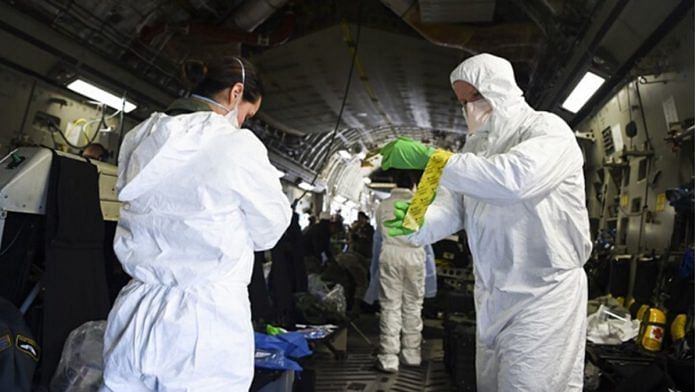For decades, doctors recognized a handful of ways that a diagnosis of high blood pressure could lead to disability and death: stroke, heart attack and kidney failure. Doctors in China may have now found another: the novel coronavirus. Bloomberg News reported last week that doctors have identified hypertension as “a key dangerous factor” that leads to distress and death in patients with the coronavirus. In January, for example, nearly half of the fatalities in one group of Covid-19 sufferers occurred in individuals with high blood pressure.
A different group of China-based doctors reported similar findings in the Lancet, while three other doctors hypothesized that patients who take common hypertension drugs (ACE inhibitors) are at risk of developing worse Covid-19 infections. Other underlying ailments — especially diabetes — and also contributed to deaths among patients with the virus, but none was so predictive as hypertension.
These are ominous preliminary findings. Hypertension is the leading preventable risk factor for premature death and disability worldwide. Yet most people in low- and middle-income countries like China go undiagnosed and untreated, even as the number of cases in these regions grow. For now, nobody can say for sure that countries and regions that don’t treat treatable conditions like hypertension are more vulnerable to the coronavirus. But past epidemics show that weak health-care infrastructure is less capable of managing infectious disease outbreaks. As the global community begins to look beyond the current pandemic for ways to stop the next one, a key step will be ensuring that health systems are capable of treating the most common health problems, as well as the emerging, unexpected ones.
Hypertension, like most ailments that emerge later in life, tends to happen in affluent, longer-lived societies (hunter-gatherer societies don’t have much incidence), where people have unhealthy behaviors, including poor diets, high alcohol consumption and lack of physical activity. Particularly vulnerable are low-income countries in which leisure and excessive diets are newly accessible, and where medical infrastructure hasn’t expanded as quickly as the desire to eat, for example, salty fast food.
This is especially true in China, where 153 million people — or 18% of the population — had hypertension in 2002. By 2015, it was 23.2% of the population, or 244.5 million people. An additional 435.4 million people, amounting to 41.3% of China’s population, showed early signs of hypertension. Yet, as of 2015, only 46.9% of Chinese hypertension sufferers were aware of their condition, 40.7% were taking prescribed medications, and a mere 15.3% had the condition under control.
China’s pattern isn’t unique. A 2016 survey of hypertension data from 90 countries taken between 2000 and 2010 found that 31.5% of individuals in low- and middle-income countries had hypertension in 2010, an increase of 7.7%. Yet the number of cases that were under control declined from 8.4% to 7.7%. Worst of all, low- and middle-income countries fared far worse compared with high-income countries, where prevalence of hypertension actually decreased during that period, while awareness, treatment and control percentages all increased.
These disparities aren’t difficult to explain. Diagnosis and treatment of hypertension requires general practitioners with access to basic medical equipment and medications. Yet physicians are in short supply globally: 76 countries have less than one physician per 1,000 people, which is the World Health Organization minimum recommendation. Three billion people, globally, lack access to a health professional. These problems are especially acute in the countries where hypertension diagnosis and treatment is most lacking. In China, for example, there were two doctors per 1,000 people in 2018, compared with 2.8 in Canada, but they were concentrated in cities and high-paid specializations — not general practice, especially in China’s countryside and lower-tier cities. This had tragic consequences at the dawn of the coronavirus epidemic: Wuhan hospitals were short-staffed and overwhelmed by patients.
It’s too soon to make a definitive claim that high-blood pressure is a risk factor for coronavirus complications. Determining that will require far greater numbers of infections, and peer-reviewed studies. Both are coming. But it isn’t too soon to be alarmed that coronavirus fatalities appear to happen at a higher rate in people with a well-known condition — hypertension — that’s diagnosed and treated at lower rates in low- and middle-income countries. If, in fact, this phenomenon is confirmed, it highlights something that global public health professionals have long known: Lack of access to basic health care undermines the ability to deal with bigger health crises. It’s a problem for policy makers to tackle when the pandemic has passed. –Bloomberg
Also read: Trump says China could’ve stopped ‘horrible Chinese virus’ that’s infected the world




Reduce carbohydrates intake… eat a lot of protein and vegetables. Try and loss weight and walk whenever possible. BP can affect anyone poor or rich. Also never forget to always visit a health care profession to check your pressure. Stay well
If u do CUPPING THERAPY to the patient it may reduce hypertension and detoxify the blood and blood circulation gets purifies
Its a Sunnah of (PROPHET MESSENGER OF GOD )plz do this on Corona patient’s
Friends plz do take plenty of fruits it has really slashed my BP
A silent killer. I had high blood pressure, possibly for years, without being aware of it. A chance reading alerted me, and a small tablet each morning has brought it within the safe zone. People should get themselves tested regularly.
Try long early morningruns or brisk walking e greater than 1 hour or 5 kms .to control BP. Keep taking
Medicines also .positive Effects shall come in 6 months to 1 year .
what tablet is that